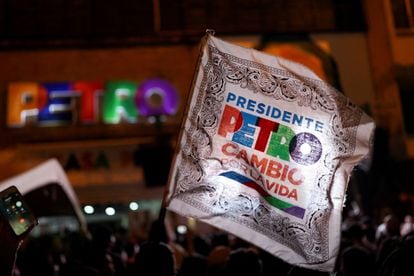Colombia's newly elected president, Gustavo Petro, announced on Wednesday that Colombia will reopen its border with Venezuela once he officially takes office on August 7. The news was warmly welcomed by the business sector of both countries, particularly by firms operating at the border, and has been taken as a sign of Petro's intention to improve relations with the neighboring government of Nicolás Maduro.
During Colombia's presidential campaign, all candidates promised to normalize relations with Venezuela Rodolfo Hernández, Petro's rival in the runoff vote, had also highlighted his intention to resume dialogue with Caracas.
Even the right-wing candidate, Fico Gutiérrez, spoke of reopening trade with Venezuela.
There was a consensus that the situation had to change.
The Venezuela-Colombia border has been intermittently closed since August 2015, following a decision by Caracas.
The decision to close the porous border came in response to the growing tension between Maduro and former Colombian president Juan Manuel Santos and the incumbent Iván Duque.
Both countries drew their ambassadors, and closed their consultants.
The border crossings between the Venezuelan state of Táchira and the Colombian department of Norte de Santander, through which most binational trade passes, have been closed to vehicles for several years.
Today people are allowed to cross on foot, but at other times, this too was restricted.
More information
How Colombia shifted to the left
During his mandate, President Duque, who will be succeeded by Petro on August 7, sought to diplomatically isolate Caracas, believing this would lead to the downfall of Maduro.
When opposition leader Juan Guaidó proclaimed himself the president of Venezuela, Duque went so far as to say that Maduro's “dictatorship only had a few hours left.”
But Guaidó's bid for power ended in failure.
Petro's decision to reopen the border may pave the way to thaw diplomatic relations, after seven years of conflict.
In addition to the reopening of the border, the Colombian airline Avianca also plans to resume regular flights to Caracas in a few months.
Luis Alberto Russián, the president of the Venezuelan-Colombian Chamber of Commerce, Cavecol, has welcomed Petro's decision.
“The establishment of formal trade lowers transaction costs, the purchase of goods between both countries.
We have to work to reopen channels, to earn trust again,” he said.
According to Alberto Russián, trade on the Colombia-Venezuelan border generated $404 million in 2021, and may rise to up to $800 million this year.
“The opening of the border helps reactivate the economy, it allows the border population to return to their daily lives,” he added, explaining that the border is so porous in some parts that it is as if the two countries were one nation.
Petro supporters celebrate his victory in the presidential elections in Cali on Sunday. STRINGER (Reuters)
“The opening of the border will mean greater dynamism in the trade of goods, fundamentally in food, supplies and parts for agriculture and industry,” agreed economist Rodrigo Cabezas, who used to be Venezuela's finance minister and now teaches at the University of Zulia.
He explains that Colombia will benefit more from the reopening, as Venezuela's productive sector “is not competitive.”
Giovanna de Michele, an academic at the Central University of Venezuela, also believes Colombia stands to gain more from the move.
“Venezuela has destroyed the productive sector, it does not have the capacity to put all of its products in Colombia.
The border opening must come with additional measures to promote and protect investments and legal guarantees,” she said, adding that authorities will also have to address the issue of smuggling, which has taken hold due to the border closure.
But does the border reopening signal a shift in policy with respect to Colombia?
According to De Michele, “Petro may have an initially timid approach to Maduro.”
She, however, believes that rapprochement will deepen over time.
During the election campaign, Petro – a former member of the M-19 guerilla group – tried to distance himself from Venezuela and Cuba, which he had previously defended, and focus more on Chile and Brazil.
His goal is to normalize relations with Venezuela after years of diplomatic conflict, and adopt a position similar to that of Mexican President Andrés Manuel López Obrador – Mexico's foreign policy has traditionally been based on the policy of non-intervention.
But Petro acknowledged that it is a "long process."
“Normalizing relations is not something that happens overnight,” he said to the press after announcing the reopening of the border.
And he sent a clear message about his priorities on election night: after his victory he was confirmed he made sure to call US President Joe Biden and the leaders of many other Latin American nations,

